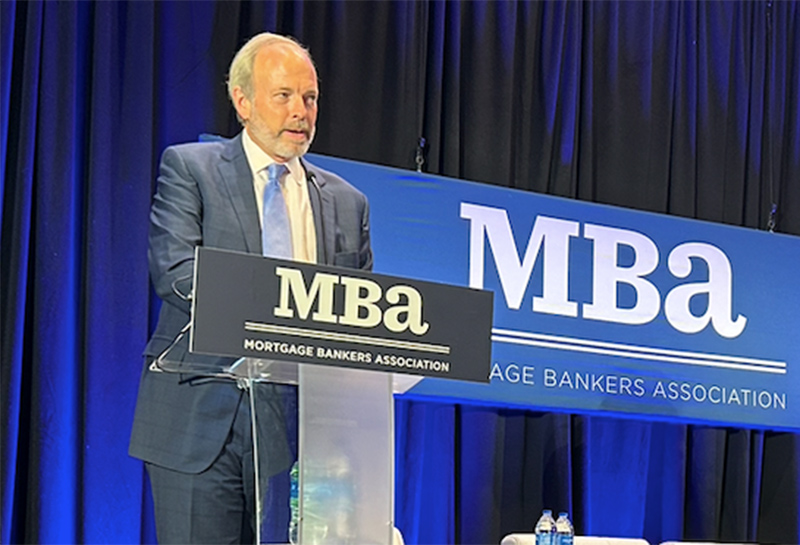
MBA’s Bob Broeksmit on Recent Trigger Leads Progress, Other Key Industry Issues to Watch

(Image via Anneliese Mahoney)
WASHINGTON, D.C.–Mortgage Bankers Association President and CEO Bob Broeksmit, CMB, took the stage at MBA’s Compliance and Risk Management Conference Sept. 23 to discuss some hot topics–including the recent addition of trigger leads provisions in the National Defense Authorization Act.
“We have worked with our allies in the Senate, led by Sen. Jack Reed of Rhode Island on the Democratic side and Sen. Bill Hagerty of Tennessee on the Republican side, to get our bill, [The Homebuyers Privacy Protection Act], attached as an amendment to the National Defense Authorization Act, one of the very few must-pass pieces of legislation that legislators must take up after the election. We learned last week that it was included in a manager’s amendment to that bill. This is a big deal,” Broeksmit said.
Broeksmit noted that the success is due in large part to MBA’s high profile and credibility in Washington, which stems from member engagement.
“The engagement from you on this to get it over the finish line is going to be really important. Let’s be that proverbial squeaky wheel that cannot be ignored,” he said.
In addition to trigger leads, Broeksmit spoke about some of the industry’s other key issues that have seen movement over the past year.
Broeksmit listed the affirmation by the Supreme Court of the Consumer Financial Protection Bureau’s funding mechanism–MBA argued in an amicus brief that eliminating it would lead to more confusion and chaos–as one such notable development.
Speaking of the CFPB, MBA recently raised concerns about some aspects of the proposed changes to mortgage servicing rules under “Regulation X.” While the association supports Reg X reform to simplify those rules, it has criticized some parts, including the language of those related to requirements around translation and interpretation services.
“Our concern is that a standard that is too broad and operationally cumbersome for servicers to execute could have the unintended effect of constraining rather than expanding access to qualified borrowers with limited English proficiency,” he cautioned.
Another CFPB-related issue to watch is “junk fees.” Broeksmit noted railing against junk fees can be a popular political talking point in an era where buying something as simple as concert tickets can rack up a number of unexpected costs.
However, Broeksmit said, pertaining specifically to the mortgage industry, many of the fees that are alleged as junk serve significant purposes–and in many cases are required by various government entities.
The Federal Housing Finance Agency at the beginning of the summer gave conditional approval for Freddie Mac to purchase single-family closed-end second mortgages in a limited pilot program. Broeksmit reported that FHFA was responsive to many comments and questions raised by MBA in the lead up to approving it.
But, on such issues, Broeksmit again highlighted how important industry and member engagement can be.
“We want to be sure it benefits lenders of all sizes and business models and does not crowd out the private-label securitization market for second liens,” he said. “This is where your role is indispensable. The more we know about how the program is affecting you, the more impact we can have with regulators.”
On GSE repurchases–another important issue over the last couple of years–Broeksmit said MBA has been leading the efforts to lower the incidences of loan repurchase requests associated with defects, particularly on performing loans.
“Freddie Mac’s pilot aimed at reducing such repurchases, including for small lenders, along with its efforts to improve its own quality control process, are steps in the right direction and adopt many of MBA’s recommendations. We continue to urge Fannie Mae to undertake a similar program, to improve the loan repurchase process and substantially reduce repurchases on performing loans, or even eliminate them altogether,” he said.
Property insurance continues to be top of mind, and MBA has remained engaged on that issue. And, the developments from the National Association of Realtors and Chevron rulings, Artificial Intelligence and its regulation, tax policy and many other issues important to industry members are being watched closely by MBA, as well.
“MBA has a lot of credibility throughout government agencies, we communicate clearly and in great detail how rules governing compliance and risk management are affecting or could affect the industry and its customers,” Broeksmit said.
Of course, perhaps no issue is more discussed right now than who will win November’s elections–both at the presidential level and who ends up controlling Congress.
But, regardless of who wins, Broeksmit noted, “regulation of our industry has become a thicket of overlapping, duplicative and contradictory rules.”
Broeksmit recalled he has proposed the idea of a national housing policy director, to oversee all policies across the industry–regardless of issuing agency–and avoid duplicative or contradictory requirements.
“The current approach is clearly failing the American people. Democrats and Republicans agree that affordable housing is too scarce and costs are too high. Maybe there’s a chance for bipartisan cooperation,” Broeksmit said. “We need to encourage a new era of safety, trust and innovation, not continue this slouch toward stagnation and discontent.”
